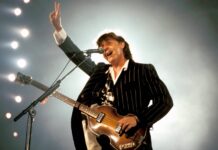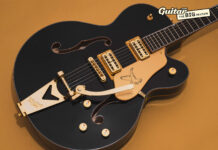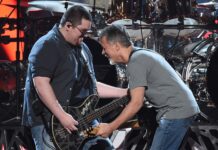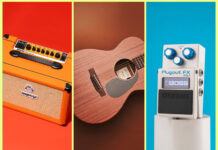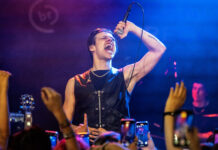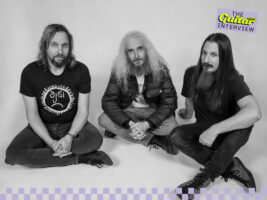
The Aristocrats’ Guthrie Govan on digital amps, effects and “a certain kind of weird note choice”
There was a time when Guthrie was just known for being just the most technically gifted guitarist of his (or perhaps any) generation. But in the near two decades since the release of his debut album Erotic Cakes in 2006, the British guitarist has played with everyone from Asia to Dizzee Rascal to Hans Zimmer and honed his playing to create a weird and wonderful style that’s all of his own and entirely inimitable.
It’s a style that in recent years has become the focal point of a band of prod-fusion voyagers known as The Aristocrats. A band that started out as a one-practice NAMM jam that brought together three of the world’s most gifted musicians (with Marco Minnerman on drums and Bryan Beller on bass) and enabled them to build a successful career playing exactly the sort of music they wanted – without any kind of compromise. This is probably the reason why they ended up creating the first instrumental album to receive a parental advisory sticker for explicit content, and also why back in February they became probably the first band to release a concept album about a duck.
READ MORE: Marcus King on pushing himself out of his comfort zone with Rick Rubin
Yes a duck. Specifically, the subject of Duck is a “web-footed Antarctic island native fleeing a penguin policeman all the way to New York City…where considerable misadventure and danger await”.
The kind of silliness is important to the Aristocrats appeal, because the seriously mind-boggling dexterity of their playing coupled with genre hopping-arrangements often requires a streak of surrealism as a sort of counterbalance.
It is also very Guthrie – a man who has been a staple of guitar magazines since the early 90s, but never seemed fully comfortable as a solo artist in the mould of many other shred icons. The Aristocrats is a unique and strange beast but a match made in musical heaven – they all share a similar sense of humour, similar eclectic influences, and perhaps most importantly they all possess a knack for graciously navigating any possible musical scenario thrown at them. It says a lot that Guthrie has shelved higher profile gigs with Steven Wilson and Hans Zimmer in order to focus on touring the band – it’s Guthrie as his most authentic, as one of the most innovative and iconoclastic guitar players of his generation.
The Aristocrats, 2023. Image: Jon Luini
The solo in Duck’s opening track Hey, Where’s MY Drink Package? is almost a sonic doff-of-the-cap to the late great Frank Zappa. A lot of guitarists struggle to really appreciate Zappa’s soloing from, what is it about him that you admire?
“When I first discovered Zappa, it took me a while to ‘get’ where he was coming from as a guitar soloist, so I fully relate to what you’re saying. At first, I struggled with the idea that he could write such challenging music, assemble a superhuman band to execute all of those impossible parts flawlessly… and then solo over the top with such reckless abandon?!
“I came to realise that perhaps this was the whole point: whilst the compositions themselves demanded a lot of mechanical precision, I sense that FZ himself was trying to sound as organic and ‘human’ as possible. I remember having a little ‘eureka’ moment when I read an interview in which Frank explained that his soloing was partially driven by a desire to evoke the rhythms of human speech. For me, Frank’s playing feels like true improvisation: he never seemed to run out of ideas and I find something exhilarating and liberating about hearing someone play so fearlessly.”
Here Come the Builders cuts a very frustrating angst-ridden opening riff; was this a cathartic exercise based on a horrible experience?
“Absolutely! That song came about during the pandemic, when much of society as we know it had ground to a halt and yet the construction industry was evidently immune to most lockdown restrictions. I remember sitting in my London flat, slowly trying to work on a relatively sensitive jazz-flavoured ballad (no, really!) whilst a veritable army of builders was hard at work outside, gleefully demolishing the building just across the road from me and subsequently replacing it with a new one. Gradually their incessant drilling and hammering began to affect the entire mood of the song, until I was forced to conclude that the universe was clearly instructing me to abandon the whole ‘jazz ballad’ concept and instead to document the constant disruption all around me. To my ears, the final version of that song actually evokes something of a “big band” arrangement vibe, despite the spartan trio instrumentation. It’s funny how things can turn out sometimes!”
Your playing has always featured a dose of chromaticism but over the years it has almost become an essential ingredient of your solo work, especially so throughout Duck. What draws you to this musical flavour?
“Over the years, I’ve done a fair amount of live playing in jazz/fusion settings where chromatic flavourings are considered relatively conventional – all of that has doubtless left me with a higher tolerance for a certain kind of weird note choice.”
“I probably take a perverse delight in trying to find a home for some of those more jagged/dissonant elements within a rock power trio format. To use the eminently splendid Scott Henderson as a swift point of reference: I enjoy everything he plays but I somehow find it more enjoyably startling to hear him veering into ‘outside’ territory when he’s using an SRV-esque tone and playing over a typical 12-bar progression, as opposed to using his older Elektric Band fusion rig and navigating a complex jazz progression. Sometimes the context can contribute just as much to the shock factor as the notes themselves…”
It’s taken a while for you to integrate digital modelling into your setup but it seems that the Fractal Audio FM9 digital amp modeller has now become a mainstay?
“My modelling ‘journey’ began about a decade ago when Hans’ live band came into being. In that situation, everyone with an electric instrument had to cope with not having a real amp on the stage because we were sharing the space with a choir and an orchestra.
“These days, the Fractal ecosystem feels the most like my digital “home”. I had an Aristocratic epiphany several tours ago, when I realised that an all-digital approach would enable me to dial in a more genre-appropriate tone for each song, rather than relying on a single amp to cover all of the sonic ground. I think it’s unrealistic to expect any one amp to be able to ‘do it all’ – that approach will always lead to compromises, at least in a wilfully eclectic band like this one. As a bonus, using a Fractal rig also means that I can have the same sound anywhere in the world – no more one-off exotic festival gigs where I have to use a broken-down rental Marshall!
“For our new set, I’ve been programming all kinds of fun new noises – a pseudo-12-string patch, an approximation of a violin, a 16th note step sequenced filter, a patch where I can cross-fade between two different amps, a variety of ultra-long reverbs being fed by an expression pedal et cetera.
“Striving to recreate the ‘real amp’ experience on stage with the Aristocrats has been quite a learning curve for me but I’m feeling pretty good about it all these days. I recently discovered the Laney LFR series full-range cabinets, which come closer than anything else I’ve encountered in terms of replicating the feel of a traditional cabinet whilst retaining the ability to switch between different speaker models on a song-by-song basis. Hopefully the audience also benefits from those Laney cabs.”
Are you still experimenting or are you now settled on a sound?
“I’m still experimenting – I actually like the idea of allowing that to be a continually evolving process. Knowing how much flexibility a digital live rig can offer has already spilled over into some of my ideas about how to write for The Aristocrats. For our current live shows, I have a separate preset, containing up to eight different ‘scenes’, for each song so I can switch to the most appropriate amp setting (or indeed amp!) for each section. It’s all about finding a balance so I have maximum stylistic flexibility but the set as a whole still retains some kind of sonic consistency.
“Currently, I suppose the closest thing I have to a “default” overdriven amp would be one of the Friedman HBE models. Finding the right clean sound is actually more of a challenge for me these days. It’s nice to have the option of using an ultra-clean Fender model but in this band I’ve found that clean tones need to have significantly more gain and overtone content than you might think, otherwise they’ll disappear in the mix. I’m currently exploring some Bassman and AC30 amp models for some grittier clean sounds.”
In recent years you’ve introduced more effects, especially delay, into the recipe…
“For years, I tried to keep my time-based processing to a bare minimum when playing live, reasoning that a drier tone would retain more clarity in acoustically challenging venues. I still think there’s some truth in that principle, but I really started to crave a little more wetness when I became involved with Hans Zimmer Live.
“In that band, the only guitar tone I can hear is what’s coming through my in-ear monitors. A totally dry guitar in an IEM mix is no fun at all so I gradually started to blend in some more flattering delays and reverbs, whilst urging the sound man to let me know if the results ever became unusably over-processed out there in the FOH “real world”. I suppose that’s really what led me down the rabbit-hole of experimenting more with effects, and these days I’m actually having an unexpected amount of fun with that stuff!”
How do you deal with the adulation that someone in your position is often subject to? Has it affected your ego, or at least helped boost your confidence in what you’re doing?
“Being something of an introverted weirdo with a well-documented allergy to selfies and such like, I’m sure I frequently fail to respond in the most natural way when someone randomly approaches me in the street to tell me that they like my playing, but it’s not lost on me that people’s enthusiastic support is the one thing which actually enables me to do what I love for a living! For that I am, of course, profoundly grateful.
“I think the time in my life when I felt the greatest need for validation and positive feedback was probably when I started sending demo tapes to Mike Varney in the late 1980s [the Shrapnel Records founder who famously offered Guthrie a record deal only for the guitarist to turn it down, despite him having sent the tapes in – Ed].
“These days, I’m still very much my own worst critic but hopefully I’ve found a slightly healthier balance. Part of me still wants to do an infuriating number of takes every time I have to record a solo in a studio environment but I also have a flip side which is entirely willing to take impulsive musical risks on stage. As for the question of ego: that word is frequently perceived to have negative connotations but I would argue that true motivation very much requires some degree of belief that you have at least the potential to create something of value.
“With regard to my own creative output (as opposed to a session scenario) I think it’s important not to pay too much attention to other people’s opinions, regardless of what they might be. You can always depend on the comments section of a typical YouTube video to cover the whole gamut, from embarrassingly gushing hyperbole to soul-crushing negativity, and I honestly think it can be dangerous to take any of it too seriously. I suppose my goal is simply to create music which I would like to hear, in the hope of attracting the kind of listeners whose tastes naturally overlap with mine.”
The post The Aristocrats’ Guthrie Govan on digital amps, effects and “a certain kind of weird note choice” appeared first on Guitar.com | All Things Guitar.
Source: www.guitar-bass.net


